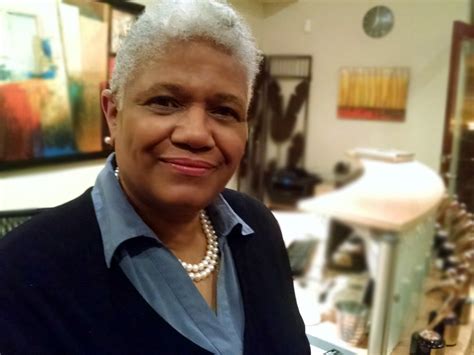A Quote by Ted Dekker
Grow up? Get herself straightened out? Her mind reeled from the verbal battering. No matter what she did, her father would tell her she was wrong. Worthless. Undeserving.
Related Quotes
She bent her finger and then straightened it. The mystery was in the instant before it moved, the dividing moment between not moving and moving, when her intention took effect. It was like a wave breaking. If she could only find herself at the crest, she thought, she might find the secret of herself, that part of her that was really in charge. She brought her forefinger closer to her face and stared at it, urging it to move. It remained still because she was pretending... . And when she did crook it finally, the action seemed to start in the finger itself, not in some part of her mind.
Perhaps I will die too, she told herself, and the thought did not seem so terrible to her. If she flung herself from the window, she could put an end to her suffering, and in the years to come the singers would write songs of her grief. Her body would lie on the stones below, broken and innocent, shaming all those who had betrayed her. Sansa went so far as to cross the bedchamber and throw open the shutters ... but then her courage left her, and she ran back to her bed, sobbing.
But she did not take her eyes from the wheels of the second car. And exactly at the moment when the midpoint between the wheels drew level with her, she threw away the red bag, and drawing her head back into her shoulders, fell on her hands under the car, and with a light movement, as though she would rise immediately, dropped on her knees. And at the instant she was terror-stricken at what she was doing. 'Where am I? What am I doing? What for?' She tried to get up, to throw herself back; but something huge and merciless struck her on the head and dragged her down on her back.
So firm did Nivea's determination become that she wrote in her diary that she would give up marriage in order to devote herself completely to the struggle for women's suffrage. She was not aware that such a sacrifice would not be necessary, and that she would marry a man for love who would back her up in her political goals.
I found her lying on her stomach, her hind legs stretched out straight, and her front feet folded back under her chest. She had laid her head on his grave. I saw the trail where she had dragged herself through the leaves. The way she lay there, I thought she was alive. I called her name. She made no movement. With the last ounce of strength in her body, she had dragged herself to the grave of Old Dan.
Think about the number of times someone will say to herself, "I want to get out of this circumstance, but I'm too afraid. I'll lie about how happy I am in this marriage, and I'll put up a front." But she's betraying everything that's in her heart. She's making choices that are harming her, and that's why she's hurting. Her intuition is trying to tell her that.
Tessa had begun to tremble. This is what she had always wanted someone to say. What she had always, in the darkest corner of her heart, wanted Will to say. Will, the boy who loved the same books she did, the same poetry she did, who made her laugh even when she was furious. And here he was standing in front of her, telling her he loved the words of her heart, the shape of her soul. Telling her something she had never imagined anyone would ever tell her. Telling her something she would never be told again, not in this way. And not by him. And it did not matter. "It's too late", she said.
She didn’t understand why it was happening,” he said. “I had to tell her she would die. Her social worker said I had to tell her. I had to tell her she would die, so I told her she was going to heaven. She asked if I would be there, and I said that I would not, not yet. But eventually, she said, and I promised that yes, of course, very soon. And I told her that in the meantime we had great family up there that would take care of her. And she asked me when I would be there, and I told her soon. Twenty-two years ago.
Once upon a time there was a girl who wanted to put her fist through a mirror. She would tell everyone it was so that she could see what was on the other side, but really, it was so that she wouldn't have to look at herself. That, and because she thought she might be able to steal a piece of glass when no one was looking, and use it to carve her heart out of her chest.
The universal nature has no external space; but the wondrous part of her art is that though she has circumscribed herself, everything which is within her which appears to decay and to grow old and to be useless she changes into herself, and again makes other new things from these very same, so that she requires neither substance from without nor wants a place into which she may cast that which decays. She is content then with her own space, and her own matter, and her own art.
And what I tell people is this - as a citizen of this country, there are certain rights that are given to you. Officer Encinia's decision to forcibly remove Sandy from her vehicle, which predicated on the fact that he asked her to do something - he did not lawfully order her to do something - to which she responded with a question. And for that - for that - I celebrate her because during a time where so many people would have remained silent she stood up for herself, and she invoked the rights that are due to her, and that is not unlawful.
Her [Eleanor Roosevelt] father was the love of her life. Her father always made her feel wanted, made her feel loved, where her mother made her feel, you know, unloved, judged harshly, never up to par. And she was her father's favorite, and her mother's unfavorite. So her father was the man that she went to for comfort in her imaginings.
But what I kept wondering about is this: that first second when she felt her skirt burning, what did she think? Before she knew it was candles, did she think she'd done it herself? With the amazing turns of her hips, and the warmth of the music inside her, did she believe, for even one glorious second, that her passion had arrived?
She realized how many of her beliefs were either unrealistic or belonged to her deceased parents and her ex-husband. She also realized that her expectations for herself and others were sometimes too rigid. She was trying to live up to what everyone else said was best for her, which made her depressed and hard to be around at times. Once she changed her beliefs about herself and others, she began to smile more and enjoy life.
She emptied herself of Fabio and of herself, of all the useless efforts she had made to get where she was and find nothing there. With detached curiosity she observed the rebirth of her weaknesses, her obsessions. This time she would let them decide, since she hadn't been able to do anything anyway. Against certain parts of yourself you remain powerless, she said to herself, as she regressed pleasurably to the time when she was a girl.
































